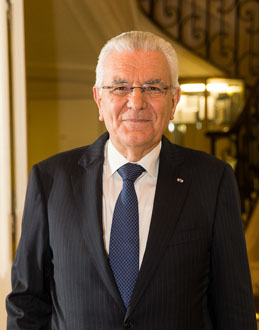On the occasion of the three-year renewal of its 36 members from the three Governmental, Trade Union and Employers’ colleges - including 3 members representing AMAF (Mrs Marie Odile Joris, Mr Guy Thomas Levy-Soussan and Mr Jean Danckaert) - we met the Chairman, Mr André Garino.
Can you remind us what is the role of the Economic and Social Council in the Principality of Monaco?
The Economic and Social Council is a consultative creative force which pronounces opinions, wishes and resolutions on matters related to the life of the country. Thanks to the representativeness of the members chosen from all civil society partners, and their experience and professional relationships, our work addresses current and prospective concerns. There is also broad consensus on it in plenary session to favour the seeking of harmonious economic and social development.
The final reports conveyed to all Monegasque authorities are in many cases technical and contribute to reflection on legislative work for general interest. Topics of a financial nature are dealt with under the aegis of the finance section.
Which topics are being studied?
Among our topics at this beginning of mandate, there are common denominators grouped by family.
Themes around digitalisation and the digital economy, such as electronic signature, electronic archiving, network security, means of control and the legislative framework of evidence, as well as the implementation of remote working, are the many topics currently being addressed in several of our sections.
Indeed, we note that the evolving nature of technology and its associated risks often constitute obstacles for investors and fears for consumers. The lack of implementing legislation in this area creates uncertainty and insecurity which are not conducive to financial investment and the development of new activities. So it is quite normal that these cross-cutting topics are included in the concerns of our Assembly.
One common component of these and other themes is the question of ‘environment and sustainable development’, examined in particular in the section of the same name. Reflection is ongoing on energy transition, the impact of implementing the environmental code, intra and extra muros traffic saturation, and environmental standards related to buildings’ lifecycles. All this work and other work more specific to this theme of the environment, fuelled by the CES des Jeunes which will celebrate its 10th anniversary this year, is also part of the Principality of Monaco’s objective to reduce carbon emissions 50% by 2030 and to achieve carbon neutrality by 2050.
To develop Monaco’s attractiveness, several members including those of the Financial Affairs section, are also contributing to reflection on the evolution of private international law, and particularly the provisions applicable to conflict of laws and to inheritance.
Furthermore, I have no doubt that over the next three years these themes will be expanded with other topics proposed by Monegasque civil society, whose great dynamism and international component is known.
The previous mandates’ work on financial affairs can be found on www.ces.mc.






